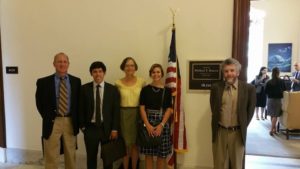FOR IMMEDIATE RELEASE: July 12, 2016
Colorado Farm & Food Alliance Brings Rural Delegation to Washington DC

PAONIA CO – Since soon after its earliest settlers moved into Colorado’s North Fork Valley, the area has relied on two major forces to drive its economy: energy and agriculture. This week community leaders from one of Colorado’s top coal-producing regions are taking a message to the nation’s capital that energy and agriculture should remain a top focus for its prosperous future.
“Our valley has been helping to power and feed America for a hundred-and-twenty years,” said Pete Kolbenschlag with the Colorado Farm & Food Alliance, which organized and raised the funds for the trip. “The North Fork can continue being an energy and agricultural leader, but we need to adapt that proud heritage and history to the 21st Century.”
In addition to the Colorado Farm & Food Alliance the trip includes representatives of Solar Energy International and the Western Slope Conservation Center. These organizations have come together to make the case that western Colorado, and Delta County’s North Fork Valley in particular, are well-suited to face these changing and challenging times.
“One thing is certain with the decline of coal markets and mine closures: western Colorado’s coal-dependent communities will need to change as they transition economically,” said John Gavan who sits on the board of Solar Energy International, as well as the boards of Delta County Economic Development and Delta Montrose Electric Association. “However, with a strong vision and smart collaboration ‘Delta County 3.0’ can be the shining star of the Western Slope.”
Like other rural coal-dependent communities across Colorado, the North Fork Valley faces an uncertain economic future. It also faces challenges brought about by the reality of global climate change, with its agricultural heritage particularly vulnerable. Climate change is a real and present danger to Colorado and its way of life. Action is imperative. Part of that is to accept the necessity to transition to new and cleaner energy and power sources. But communities must work together to implement state and national priorities in a manner that benefits impacted residents.
A leader in that effort—both outside western Colorado and within—is Solar Energy International. Through programs like “Solarize Delta County,” this global leader in renewable energy training is bringing its tremendous knowledge and expertise to make a real difference to rural communities in the region. “SEI is excited to bring our vision to DC,” said Marla Korpar with SEI. “We have a plan that we would like to see brought to fruition to help rural electric cooperatives across the United States to put more renewable power on the grid, and we want to make sure that our elected leaders and federal policy-makers are ready to stand with us and make that plan a reality.”
In addition to the tremendous solar potential in western Colorado, the area’s many irrigation ditches and canals, which originate in the Rocky Mountains and drop precipitously into the valleys below, have tremendous potential for small- to medium-scale hydro-electric projects.
And even with coal mine closures, they too can continue generating power for decades to come. The mines continue to vent methane gas, not only when they are operating but long after they are shuttered. This gas can be captured and converted to power, as has been done already at the now-closed Oxbow Mine in Somerset. Methane is a valuable energy resource that can be converted to generate electricity while significantly reducing its climate impacts, which are more than 20 times more potent as a greenhouse gas than CO2.
“The 3 Megawatt pilot project at the Oxbow mine shows that coal mine methane capture and conversion is not only viable as a power supply, but a tremendous opportunity to create jobs, support mine reclamation, and benefit the environment,” said Karen Ortiz with the Western Slope Conservation Center. “By taking this matter to Washington, we want to make our federal agencies aware that there are solutions available now that can move us toward cleaner power supplies, give an economic boost to struggling rural communities, and model fair and meaningful action.”
The North Fork delegation currently has meetings with both Colorado U.S. Senate offices, the U.S. Environmental Protection Agency, the White House Council on Environmental Quality, and the U.S. Bureau of Land Management. The goal of the delegation is to help address real and pressing issues like climate change while allowing families that have lived in western Colorado for generations–farming, mining coal, contributing to their communities—to continue as active participants in creating a 21st Century economy.
The Colorado Farm & Food Alliance connects people from farm-to-table by engaging Colorado’s local farm and food proprietors and aficionados as leaders in sustainability and environmental action. Solar Energy International provides industry-leading technical training and expertise in renewable energy to empower people, communities, and businesses worldwide. The Western Slope Conservation Center is the oldest conservation group in the North Fork Valley founded to protect, monitor, enhance and educate its residents and policy-makers about the precious natural resources of the Lower Gunnison Watershed.
# # #
CONTACT: Pete Kolbenschlag, Colorado Farm & Food Alliance 970-261-0678

